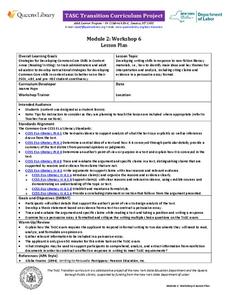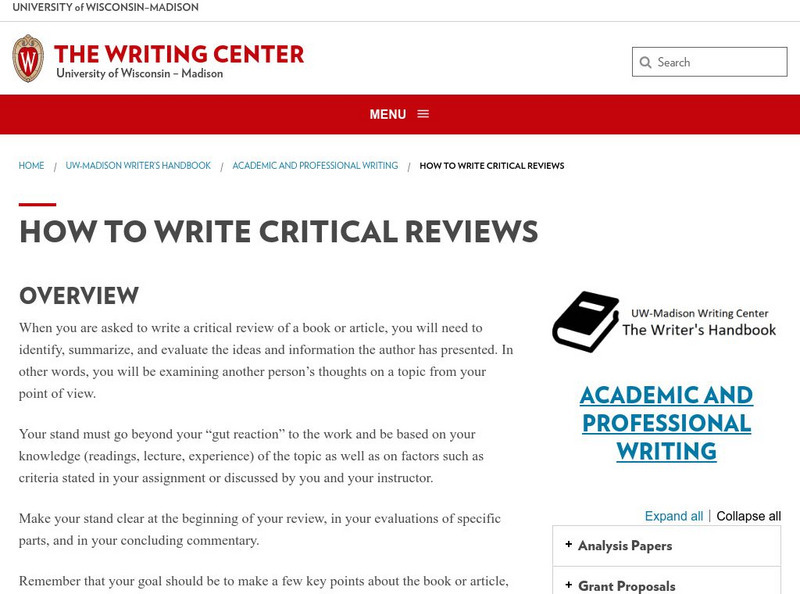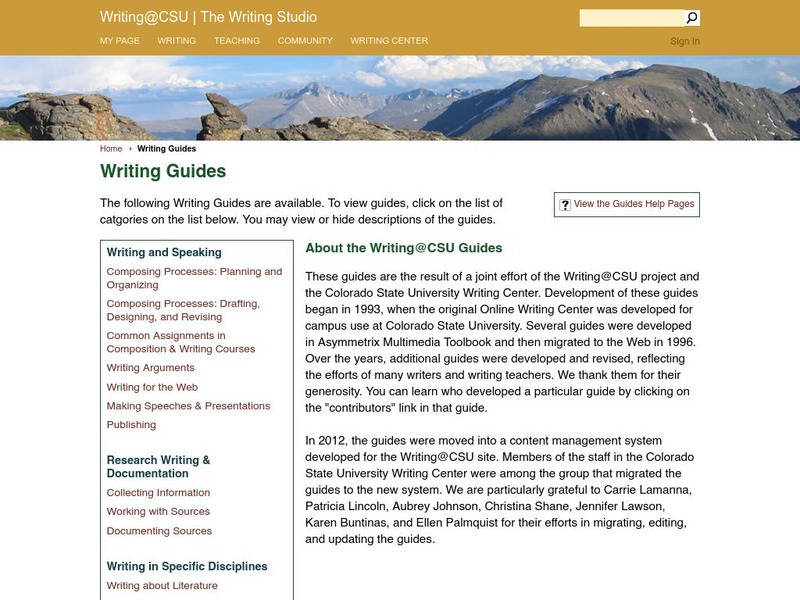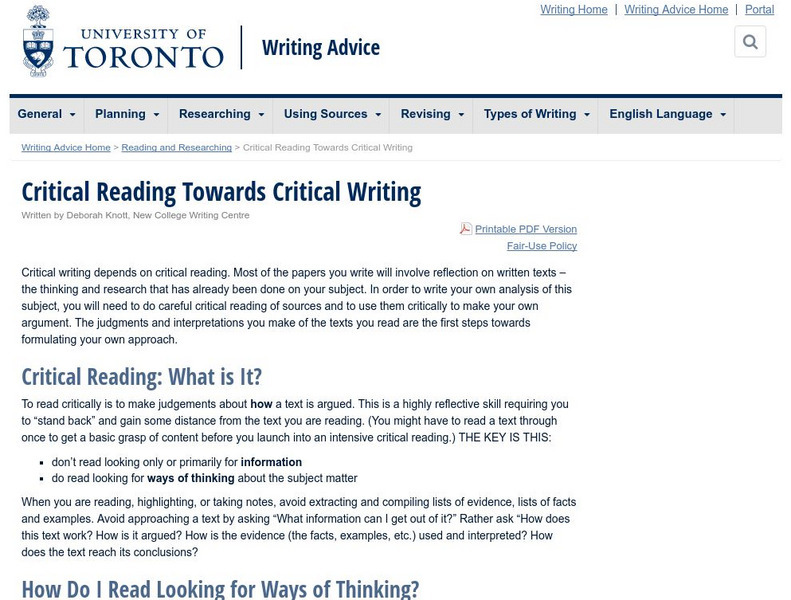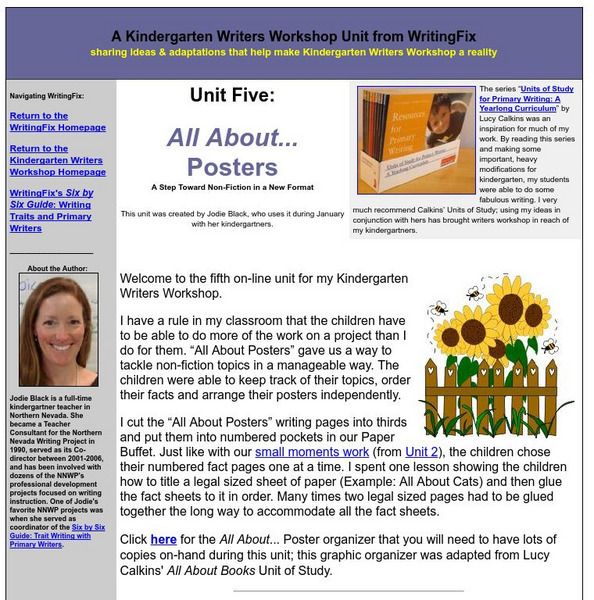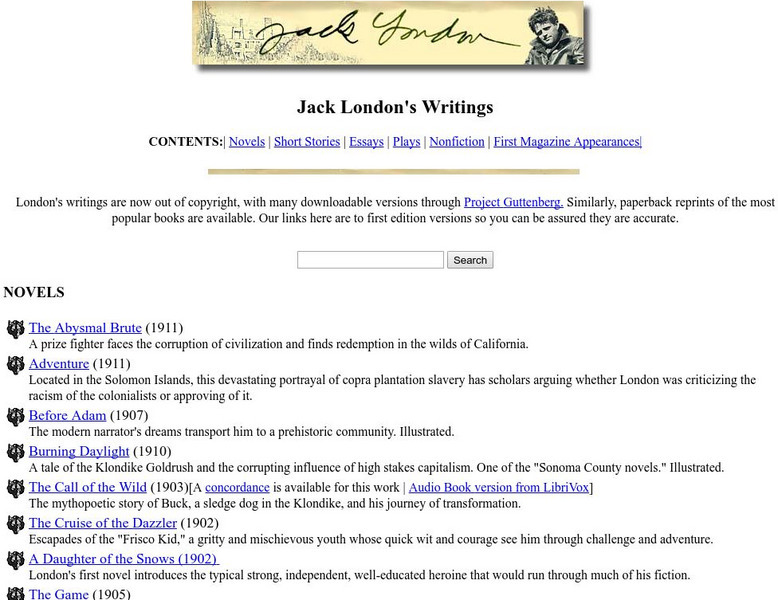EngageNY
TASC Transition Curriculum: Workshop 6
Is a college education necessary for success in today's world? The class investigates the question, along with others at the end of the sixth workshop in a 15-part series. The lesson has four parts with multiple activities and...
New York State Education Department
TASC Transition Curriculum: Workshop 5
Are video games sports? Pupils investigate this question as well as various nonfiction selections to learn more about claims and the support that defines them. All of the selections mimic the rigor on state tests and encourage close...
EngageNY
TASC Transition Curriculum: Workshop 12
How can opinions slant facts? Workshop participants learn how to examine primary and secondary sources and identify the author's point of view. They also examine how visual art impacts the meaning and rhetoric of sources. Full of...
National Endowment for the Humanities
Neh: Edsit Ement: Introducing the Essay: Twain, Douglass and American Non Fiction
This lesson plan serves as an introduction to American literary non-fiction writing and focuses primarily on teaching some basic approaches to recognizing rhetorical strategies adopted for persuasive effect in essays and non-fiction. The...
ReadWriteThink
Read Write Think: Diagram It! Identifying, Comparing & Writing About Non Fiction
Introduce your students to the different types of non-fiction such as biographies, biographies, and informative books. Students will use graphic organizers, peer interaction, and hands-on experiences to further understanding of this lesson.
Better Lesson
Better Lesson: Bats, Friend or Foe. An Argument Writing Activity
Students will state an argument with evidence, for or against, bats being removed from their environment by writing a letter to the editor and citing evidence for your claim.
Online Writing Lab at Purdue University
Purdue University Owl: General Writing Resources
This helpful resource details the process of writing, including how to plan, write, and revise. Content also includes the different types or genres of writing, and exercises in grammar and mechanics.
University of Wisconsin
University of Wisconsin Madison: Writing Center: Reading a Book to Review It
Advice on steps to take and things to think about while reading a book to be reviewed. These directions will be particularly useful when reviewing non-fiction, but can be modified to work for fiction, too.
University of Wisconsin
University of Wisconsin Madison: Writing Center: How to Write Critical Reviews
This site provides the viewer with a step-by-step guide to writing critical reviews for non-fiction works. Its steps include analyzing the assignment as well as writing a clear introduction, body, and conclusion. Links to other writing...
Wisc-Online
Wisc Online: Writing Effective Paraphrases
In this learning module, students practice paraphrasing brief, non-fiction passages.
Better Lesson
Better Lesson: A Storm of Ideas
The first step in writing an informational text on the topic of learners' choice is helping the student choose a topic of interest. Students will brainstorm ideas that will be possible final topics.
Colorado State University
Colorado State University: Writing @ Csu Writing Guides
This is a fairly sophisticated series of writing guides. It assumes that users already have a solid grasp of spelling, grammar and mechanics, so it focuses more on organization and types of presentation than on more basic skills....
TES Global
Tes: Non Fiction Unit 4 Formal/impersonal Writing: Tourists
[Free Registration/Login Required] Learners will analyze tourism brochures to determine features related to nonfiction writing in this unit. Tourism websites may be used in lieu of the brochures. Cotswold and the North Leigh Roman Villa...
ReadWriteThink
Read Write Think: Question and Answer Books From Genre Study to Report Writing
Contains plans for eight lessons that explore Question and Answer Books and ask students to do research in order to write their own. In addition to objectives and standards, these instructional plans contain links to sites used in the...
ReadWriteThink
Read Write Think: Text Features: Non Fiction [Pdf]
Compare the printed page to an electronic web page and use this activity to discuss the similarities and differences. A cross-curricular tie-in with ecosystems. Could easily be adapted to another subject area.
University of Toronto (Canada)
University of Toronto: Critical Reading Towards Critical Writing
Aimed particularly towards writing about non-fiction, this site describes ways to think about what you read so you can write more clearly. Focuses on analyzing the "ways of thinking" that an author uses so you can evaluate the validity...
University of Glasgow
University of Glasgow: Critical Reviews
This site is designed to be used by psychology students at the university level, but it provides helpful instruction for anyone writing critical reviews of non-fiction. Instruction includes everything from how to be critical to...
Writing Fix
Writing Fix: All About Posters
As young writers become more skilled through the Writers Workshop lessons, they can begin working to become more skilled with non-fiction writing. A series of mini-lessons, graphic organizers, and samples of student work are all provided.
PBS
Pbs Learning Media: Reach: Snails and Snacks!
Explore the sweet, slimy world of snails (and worms!) as you discover the difference between fact and fiction with videos, stories and games.
Scholastic
Scholastic: Nonfiction Writing Lessons
This series of nonfiction writing lessons was developed by Stuart Miller. Four activities include: Describing the Real World, The Interview, Writing a Profile, and Writing a Review.
The English Teacher
The English Teacher: Writing Analogies
Analogies are useful when communicating ideas that a reader wouldn't otherwise understand. This tutorial explains how to use analogy in writing.
Sonoma State University
Berkeley Education: List of Works by Jack London
Superb site from Berkeley Education for finding any work by Jack London. Included are plays, short stories, fiction, non-fiction, and essays.
Virginia Tech
Alan Review: Course Correction
Janet Bode wrote this article discussing why she writes, for whom she's writing, and the importance of non-fiction literature for young adults.
Better Lesson
Better Lesson: What Did Jimmy's Boa Eat? 1 of 2
In this lesson, students will write an informational paper by comparing fictional text and a non fiction text about boa constrictors.
Other popular searches
- Non Fiction Writing
- Ks1 Non Fiction Writing
- Non Fiction Writing
- Non Fiction Writing Memoirs
- Non Fiction Writing Prompts
- Non Fiction Writing 2 Grade
- Non Fiction Writing Lesson
- Non Fiction Writing Frames
- Non Fiction Writing Prompts
- Creative Non Fiction Writing
- Non Fiction Writing Format
- Non Fiction Writing Process
